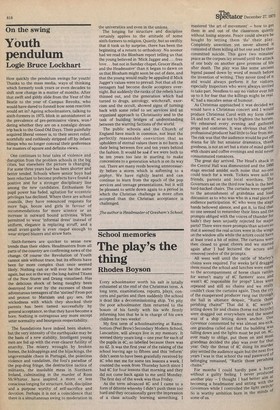On the swing
Youth pendulum
Logie Bruce Lockhart
How quickly the pendulum swings for youth! Thanks to the mass media, ways of thinking which formerly took years or even decades to shift now change in a matter of months. After that swift and giddy slide from the Year of the Beatle to the year of Campus Revolts, who would have dared to foretell how soon reaction would set in? Ageing schoolmasters, talking to sixth-formers in 1975, blink in astonishment at the prevalence of pre-permissive views, won-t dering whether they are on a nostalgic dream • trip back to the Good Old Days. Their painfully acquired liberal veneer is, to their secret relief, scornfully and ruthlessly stripped off by infant blimps who no longer conceal their preference for masters of square and definite views.
One continues to hear tales of violence and disruption from the problem schools in the big -Cities, but elsewhere the picture is changing. For some three years hair has been shorter and better tended. Schools where senior boys had been reluctant to become prefects have found a positive zest for a stronger disciplinary line among the new candidates. Enthusiasm for pupil power has faded, agitation for eccentric privileges has declined. Where there are school councils, they have renounced requests for more fags, booze and girls in favour of recommendations for more science or an increase in outward bound activities. When permitted to wear 'informal dress' instead of uniform, elegance is replacing scruff, and a small avant-garde is even risque enough to wear striped blazers and straw hats.
Sixth-formers are quicker to sense new trends than their elders. Headmasters from all parts of the country are confirming news of the change. Of course the Revolution of Youth cannot sink without trace, but its effects have been far more complex than once seemed likely. Nothing can or will ever be the same again, but not in the way the long-haifed Titans ' of the New Sturm and Drang visualised. Has the delicious shock of being naughty been destroyed for ever by the excesses of those adventurous teenagers of the 'sixties? From pot and protest to Marxism and gay sex, the wickedness with which they shocked their parents has been tamed successfully by general acceptance, so that they have become a bore. Nothing is outrageous any more except utter normality and bourgeois respectability.
The foundations have indeed been shaken, but the very intensity of the earthquake may be the basis of a new stability. Intelligent young men are fed up with the ever-clearer futility of anarchy. The misery wrought by broken homes, the kidnappings and the hijackings, the ungovernable chaos in Portugal, the pointless violence and vandalism, the fool's paradise of the pop-drug fringe, the destructive tactics of militants, the insoluble mess in Northern Ireland, culminating in the murder of Ross 1VIcWhirter, have inspired a more or less conscious longing for structure, faith, discipline and a purpose worthy of self-sacrifice and devotion. Perhaps it is not a coincidence that there is a simultaneous swing to moderation in
the universities and even in the unions.
The longing for structure and discipline certainly applies to the attitude of some .sixth-formers to religion. Quietly, but so swiftly that it took us by surprise, there has been the beginning of a return to orthodoxy. No sooner had we read the Bloxham report telling us that the young believed in 'Mick Jagger and ... free love,. . but not in Sunday chapel, Grocer Heath and the Headmaster' than it began to dawn on us that Bloxham might soon be out of date, and that the young would really be appalled if Mick Jagger's values were to prevail. Not that all the teenagers had become docile accepters overnight. But suddenly the ranks of the rebels have thinned out, and the generation which had turned to drugs, astrology, witchcraft, exorcism and the occult, showed signs of turning back with some relief to set services and an organised approach to Christianity and to the task of building bridges of understanding between the warring factions of the world.
The public schools and the Church of England have much in common, not least the perfectly reasonable conviction that as .upholders of eternal values there is no' harm in their being between five and ten years behind the fashion. It would be sad if we were both to be ten years too late in starting to make .concessions to a generation which is on its way out. There are many reeds bowing unnecessarily before a storm which is softening to a zephyr. We have rightly learnt and can continue to learn from the epoch of the pop services and teenage presentations, but it will be pleasant to settle down again to a period in _which the Christian challenge is more often 'accepted than the Christian acceptance is 'challenged.
The author is Headmaster of Gresham's School.


































 Previous page
Previous page